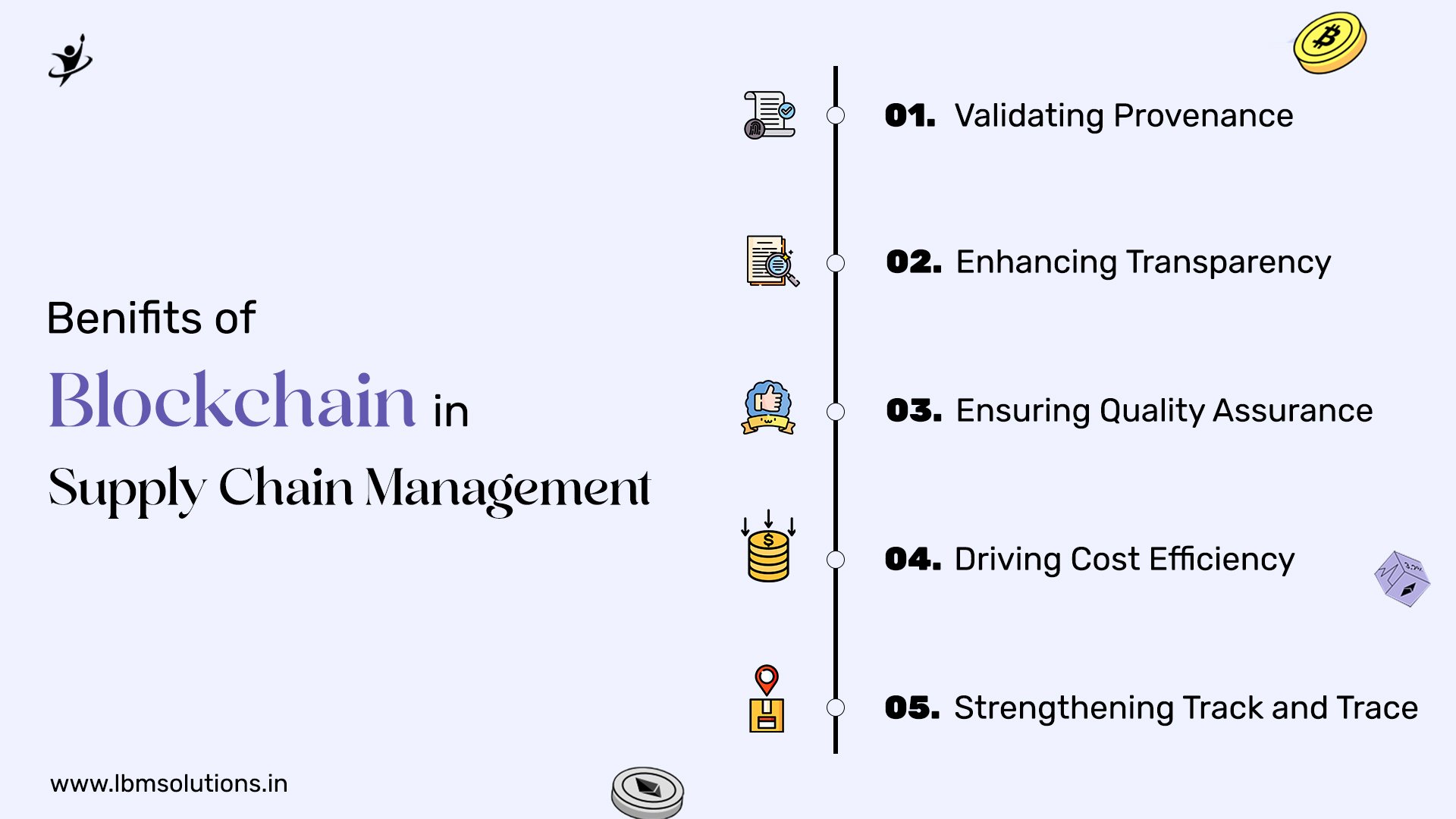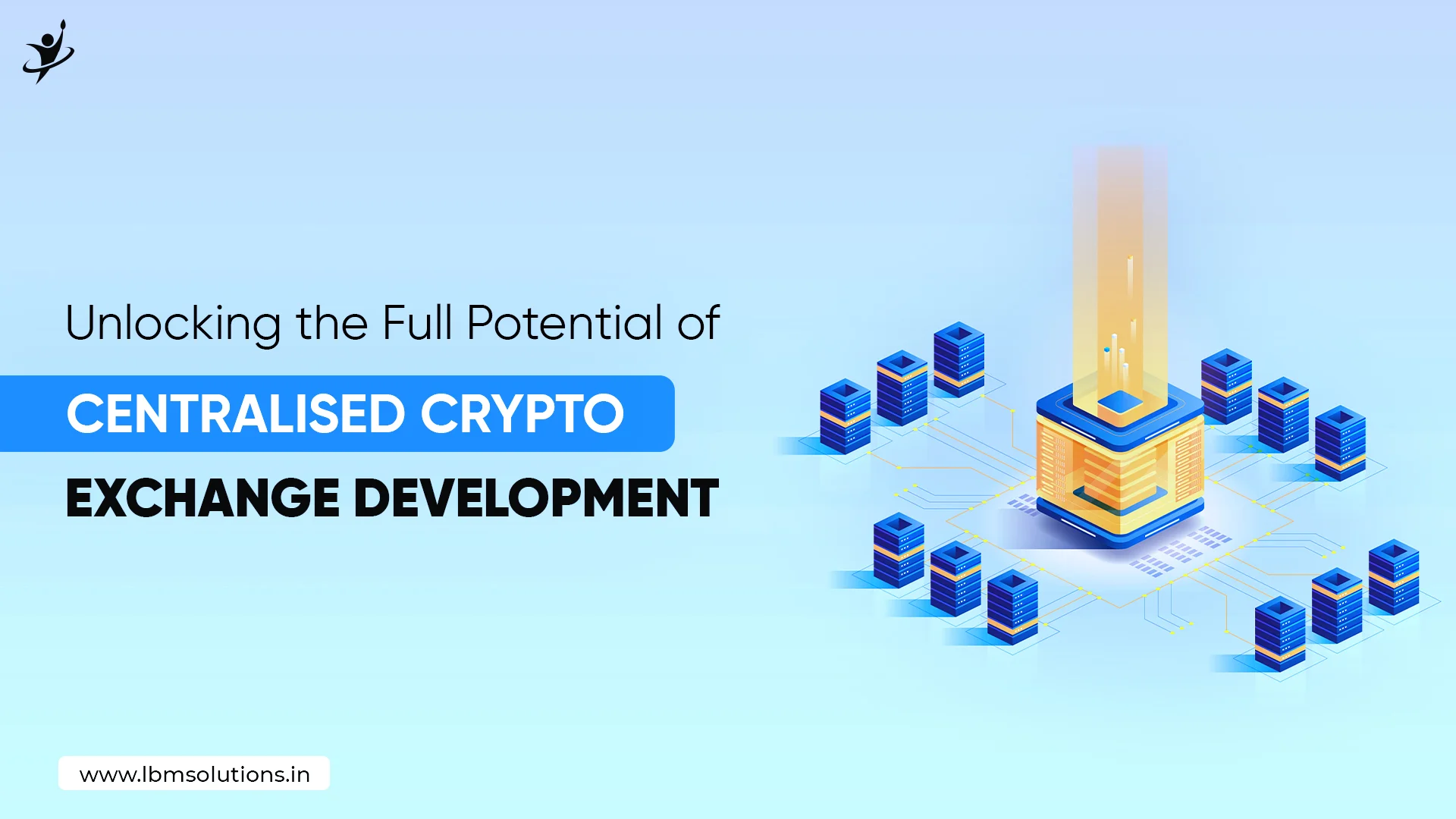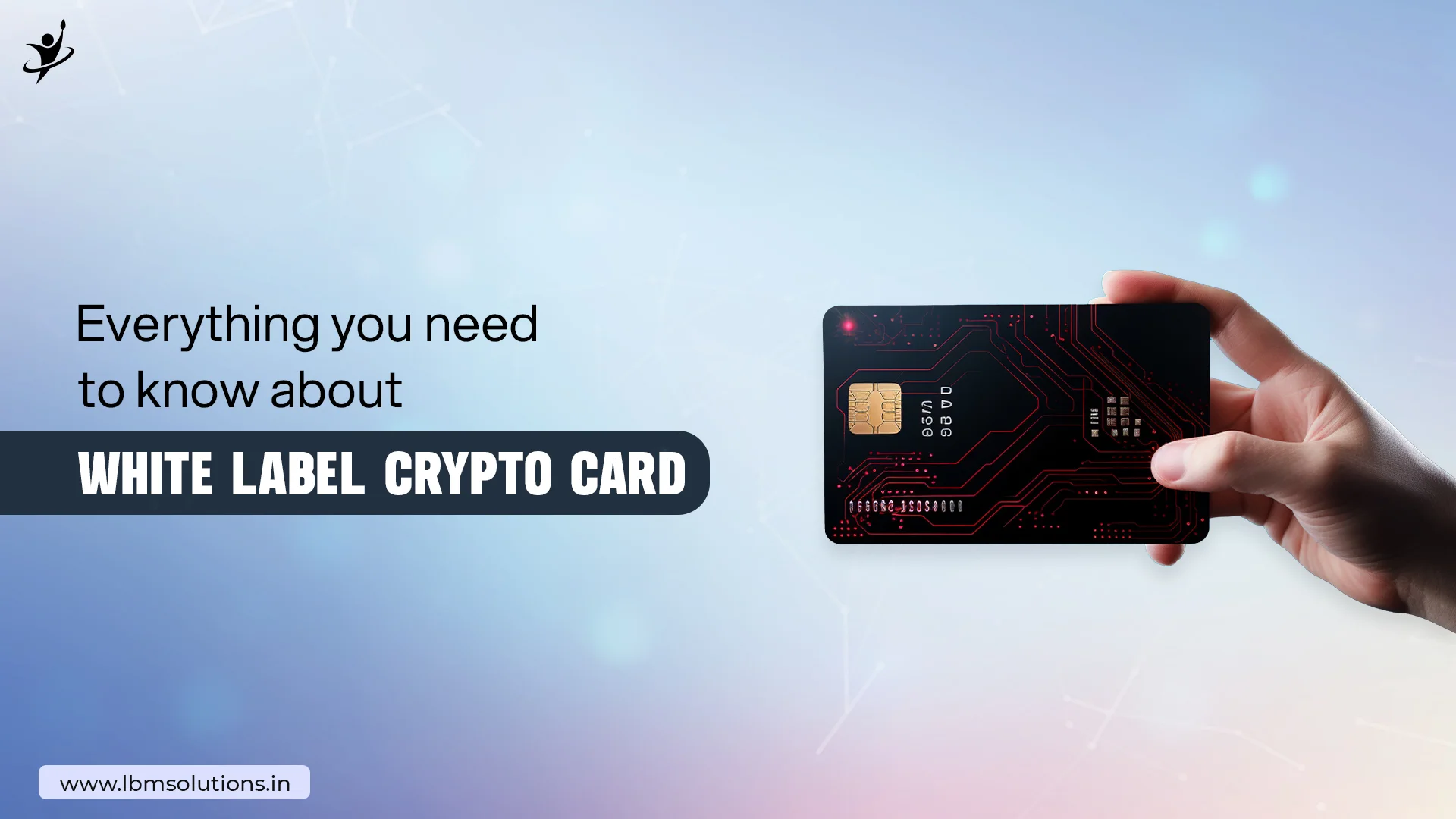In today’s interconnected supply chains, manufacturers, suppliers, logistics firms, and retailers collaborate to serve consumers worldwide. These networks, growing more extensive, face mounting complexity and fragmentation. Conventional supply chains rely on paper-based systems and disjointed data, fostering isolated information pockets and slowing product tracking. The industry-wide struggle with traceability and transparency results in delays, errors, and inflated expenses. Modern participants require a consolidated data view to combat this, empowering them to independently verify transactions, like production and transport updates, everything while maintaining privacy and security. Getting in touch with an expert blockchain development company, the people with multiple demands and expectations
Here blockchain supply chain management comes into the picture. Let’s understand the concept in detail.

 Here are some notable benefits of blockchain technology in supply chain management, addressing the complexities imposed by modern consumer demands.
Validating Provenance: Blockchain assures the integrity of valuable assets as they traverse the supply chain. By safeguarding data from tampering or corruption, it provides manufacturers and logistics providers.
Enhancing Transparency: In supply chain logistics, transparency is paramount. Blockchain simplifies the exchange of information across multiple partners, particularly evident in intricate areas like transportation logistics. This streamlined data flow enhances visibility and coordination.
Ensuring Quality Assurance: Blockchain enables comprehensive access to vital transaction information for all involved parties. This accessibility, facilitates the verification of critical milestones, ensuring quality assurance throughout the supply chain.
Driving Cost Efficiency: Blockchain implementation offers potential cost savings by eliminating manual processes in transportation logistics. Improved efficiency, fewer errors, and faster shipments reduce operational costs.
Strengthening Track and Trace: Through Blockchain, businesses can carefully track a product’s journey, confirming its origin, components, and authenticity. This helps prevent fraud by verifying genuine shipments. Furthermore, it aids in detecting potential theft or breaks in the custody chain during transport, ensuring product integrity at every stage.
Here are some notable benefits of blockchain technology in supply chain management, addressing the complexities imposed by modern consumer demands.
Validating Provenance: Blockchain assures the integrity of valuable assets as they traverse the supply chain. By safeguarding data from tampering or corruption, it provides manufacturers and logistics providers.
Enhancing Transparency: In supply chain logistics, transparency is paramount. Blockchain simplifies the exchange of information across multiple partners, particularly evident in intricate areas like transportation logistics. This streamlined data flow enhances visibility and coordination.
Ensuring Quality Assurance: Blockchain enables comprehensive access to vital transaction information for all involved parties. This accessibility, facilitates the verification of critical milestones, ensuring quality assurance throughout the supply chain.
Driving Cost Efficiency: Blockchain implementation offers potential cost savings by eliminating manual processes in transportation logistics. Improved efficiency, fewer errors, and faster shipments reduce operational costs.
Strengthening Track and Trace: Through Blockchain, businesses can carefully track a product’s journey, confirming its origin, components, and authenticity. This helps prevent fraud by verifying genuine shipments. Furthermore, it aids in detecting potential theft or breaks in the custody chain during transport, ensuring product integrity at every stage.
Introduction to Blockchain Technology and Its Transformative Potential
Blockchain technology functions as an immutable method of recording data, making it extremely challenging to alter, breach, or tamper with the system. It operates through a distributed ledger that replicates and disperses transactions across a network of connected computers. This structure, commonly termed a ‘digital ledger,’ stores transactional data, or ‘blocks,’ publicly across multiple databases, forming the ‘chain.’ Each transaction bears the owner’s digital signature, ensuring its authenticity and safeguarding it against manipulation, thereby ensuring high-level security. Blockchain supply chain management is becoming crucial in multiple aspects, thus reinforcing the role of blockchain in supply chain management for the longest time. To simplify, envision a shared Google spreadsheet among numerous networked computers storing transactional details. This ledger securely records real purchases. Notably, while the data is visible to everyone, the integrity of the information remains impervious to manipulation. Blockchain technology has a revolutionary and transformative influence on supply chain management. Within the financial domain, DeFi (Decentralized Finance) has emerged as a potent application of blockchain technology. DeFi’s core objective is to establish an inclusive financial system void of intermediaries like traditional banks. Instead, transactions are governed by smart contracts on blockchains, notably Ethereum, facilitating multiple financial functions such as borrowing, lending, asset trading, and interest-earning without intermediaries. However, while DeFi holds promise, it also carries inherent risks like smart contract vulnerabilities and cryptocurrency collateral volatility, which necessitate exploration in future discussions. In healthcare, Blockchain holds the potential to tackle persistent data management issues. It could usher in secure, interoperable health records, empowering patients to control their data and making it accessible to authorized physicians from any location. This innovation could revamp the system by bolstering data security, privacy, interoperability, and consent management, and all you need is a professional blockchain development company. Similarly, education stands to benefit from the adoption of Blockchain. Lifelong learning portfolios, securely recording and verifying learning achievements, may streamline recruiters’ validation of job candidates’ credentials. Additionally, smart contracts could automate administrative tasks, reducing reliance on intermediaries. These instances highlight the benefits of blockchain across diverse sectors. With its foundational attributes of decentralization, transparency, security, and immutability, supply chain management using blockchain technology makes way for innovation and paradigm shifts in existing systems. Recognizing these applications is pivotal, showcasing that Blockchain transcends beyond cryptocurrency support. As your understanding of the benefits of Blockchain evolves, this holistic perspective equips you to identify potential applications in various contexts, a crucial skill in today’s swiftly evolving digital landscape.How Does Blockchain Improve Efficiency and Transparency in Supply Chain Management?
Supply chain transparency, vital in today’s competitive market, ensures clear insight at every stage, fostering factual communication within and outside businesses. Initially a competitive edge, transparency is now a consumer expectation, especially with the rise of ethical consumerism. Blockchain technology, at the forefront of transparency innovation, operates as a tamper-resistant ledger across interconnected nodes. Brands like Nestlé leverage the multiple benefits of blockchain to disclose supply chain details, indicating the evolving consumer demand for transparency. Instances like consumers favoring ethically sourced products over opaque brands and public figures facing criticism for ambiguous supply chains highlight this shift in consumer preference. Blockchain enables tracking a product’s journey, securing each transaction, and curbing risks like delays, errors, and fraud. It streamlines processes, bolsters trust among stakeholders, and provides an immutable record, enhancing accountability and transparency. This innovation catalyzes efficient supply chains, reduces delays, mitigates fraud, and establishes credibility through detailed product information. Having an expert blockchain development company at your disposal can better explain the play and help you get the perfect results.Key Components of Blockchain Supply Chain Management
Beyond creating cryptocurrencies, Blockchain’s distributed ledger capabilities facilitate and oversee various transactions. Its reliability and integrity make it a valuable asset in supply chain applications. Notable features encompass:- Tracking and visualizing enterprise supply chains enhance operational efficiency, a practice known as traceability. With increasing numbers of consumers seeking detailed product sourcing information, organizations are better-comprehending supply chain management using blockchain technology and engaging consumers with accurate and unchangeable data.
- Transparency is pivotal in building trust within the market. It involves capturing essential data, like certifications and claims, and making it publicly accessible. Once logged onto the Ethereum blockchain, third-party validators can authenticate this data in real-time, ensuring reliability and openness.
- Innovatively, Blockchain introduces traceability, reshaping traditional market concepts. This functionality allows asset “tokenization,” splitting an object into digital shares representing ownership. Similar to stock exchanges trading company shares, these tokens signify a shareholder’s stake in an asset, allowing seamless trading without physically transferring ownership. This traceability feature revolutionizes asset ownership and exchange by enabling secure digital transactions without direct asset transfer.

Real-world Examples of Blockchain-Enabled Supply Chains
Blockchain technology has dramatically caused paradigm shifts in various supply chains. From e-commerce to agriculture supply chain, everything is experiencing a huge change. Professional blockchain development companies are extending a helping hand and making adjustments easier. Here are famous examples that showcase their use of blockchain supply chain technology. Walmart Since 2018, Walmart has utilized Blockchain to oversee their leafy greens suppliers, prioritizing product safety and hastening claims verification. This system deeply logs data from seed planting to shelf placement. Even after the greens hit the shelves, ongoing data addition occurs. For instance, Walmart can note storage duration and temperature. This comprehensive data allows rapid identification of compromised products. Blockchain enables pinpointing the origin of sliced mangoes within two seconds in US stores, a task consuming a week with traditional tracing methods. This expedited process enhances Walmart’s ability to swiftly respond to product issues. Many high-end brands like Walmart are using agriculture supply chain management technology to make sure the consumers are delivered the finest products.Nestle
Though Nestlé wasn’t implicated in the baby milk incident, its business felt the impact. To fortify its standing in the Chinese market, Nestlé implemented blockchain technology. This innovative solution tracks the baby formula’s journey until it reaches supermarket shelves. Consumers can scan a chip on the formula package using a mobile phone to access information about ingredients, their origins, and the producing organizations. Moreover, Nestlé equipped milk packages with antennas designed to break if tampered with. This added security measure aims to reassure customers by ensuring that products remain untouched during transit to the supermarket. The integration of Blockchain and additional security features underscores Nestlé’s commitment to transparency and product safety in response to market challenges.SkyCell
SkyCell innovatively applied Blockchain in crafting intelligent refrigerated containers for transporting medicines, integrating IoT sensors for real-time tracking. These sensors oversee the drugs’ geolocation, temperature, and humidity, crucial for maintaining optimal conditions. blockchain development company plays a pivotal role in recording these parameters and securely storing logistics documents, offering an immutable digital record serving as evidence against tampering or deletion. During the pandemic, one of SkyCell’s clients utilized this solution to ship medicines from Brussels to Mumbai amid flight cancellations. Amid temperature fluctuations from +41°F to +111°F, SkyCell’s containers maintained a safe temperature range of +37°F to +55°F. This preserved the medicines’ quality, verified through Blockchain, averting financial losses and ensuring the safety and efficacy of the medications being delivered. The successful application of blockchain technology safeguarded the company from losses and upheld the integrity of the medicines during transit.Unilever
Unilever targets a deforestation-free supply chain by 2023, prompting a quest for deeper insight into sustainability. Traditional certification systems fall short, leading Unilever to embrace Blockchain. In a pilot project in Indonesia, they traced purchased palm oil. First-mile suppliers generated digital tokens mirroring the oil’s journey. This allowed Unilever access to crucial data, unveiling details of growth and harvesting conditions. Through Blockchain, they gained transparency crucial to evaluating sustainability, moving closer to their deforestation-free goal.Understanding Off-chain Transactions
Off-chain transactions stand in contrast to on-chain ones, offering a distinct approach. On-chain transactions, synonymous with regular transactions, become valid when they alter the Blockchain, making them irreversible. Every step occurs within the blockchain network, solidifying the transaction’s status. In contrast, off-chain transactions occur beyond the Blockchain, utilizing various methods:- Direct agreement between transacting parties.
- Involving a third party, like a guarantor, ensures transaction completion, akin to modern payment processors.
- Utilizing coupons purchased with crypto-tokens, exchanged and redeemed by a recipient. Depending on the coupon service provider, this redemption may occur in the same or different cryptocurrencies.
Benefits of Blockchain in Supply Chain Management
 Here are some notable benefits of blockchain technology in supply chain management, addressing the complexities imposed by modern consumer demands.
Validating Provenance: Blockchain assures the integrity of valuable assets as they traverse the supply chain. By safeguarding data from tampering or corruption, it provides manufacturers and logistics providers.
Enhancing Transparency: In supply chain logistics, transparency is paramount. Blockchain simplifies the exchange of information across multiple partners, particularly evident in intricate areas like transportation logistics. This streamlined data flow enhances visibility and coordination.
Ensuring Quality Assurance: Blockchain enables comprehensive access to vital transaction information for all involved parties. This accessibility, facilitates the verification of critical milestones, ensuring quality assurance throughout the supply chain.
Driving Cost Efficiency: Blockchain implementation offers potential cost savings by eliminating manual processes in transportation logistics. Improved efficiency, fewer errors, and faster shipments reduce operational costs.
Strengthening Track and Trace: Through Blockchain, businesses can carefully track a product’s journey, confirming its origin, components, and authenticity. This helps prevent fraud by verifying genuine shipments. Furthermore, it aids in detecting potential theft or breaks in the custody chain during transport, ensuring product integrity at every stage.
Here are some notable benefits of blockchain technology in supply chain management, addressing the complexities imposed by modern consumer demands.
Validating Provenance: Blockchain assures the integrity of valuable assets as they traverse the supply chain. By safeguarding data from tampering or corruption, it provides manufacturers and logistics providers.
Enhancing Transparency: In supply chain logistics, transparency is paramount. Blockchain simplifies the exchange of information across multiple partners, particularly evident in intricate areas like transportation logistics. This streamlined data flow enhances visibility and coordination.
Ensuring Quality Assurance: Blockchain enables comprehensive access to vital transaction information for all involved parties. This accessibility, facilitates the verification of critical milestones, ensuring quality assurance throughout the supply chain.
Driving Cost Efficiency: Blockchain implementation offers potential cost savings by eliminating manual processes in transportation logistics. Improved efficiency, fewer errors, and faster shipments reduce operational costs.
Strengthening Track and Trace: Through Blockchain, businesses can carefully track a product’s journey, confirming its origin, components, and authenticity. This helps prevent fraud by verifying genuine shipments. Furthermore, it aids in detecting potential theft or breaks in the custody chain during transport, ensuring product integrity at every stage.











